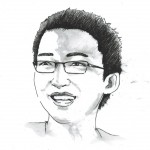On our way back home from my grandmother’s this winter, my dad picked up a copy of the local newspaper to kill time on the train. A short snippet caught his eye. According to the piece, People’s Daily, the official state newspaper of China, announced that it would “try hard to tell the truth” in the coming year as part of its new reformatting effort.
It was a moment of candor from the Communist Party’s official broadcasting organ. While few people take seriously the “news” reported by state publications such as People’s Daily, honest reporting can be difficult to find even in commercial newspapers thanks to notoriously harsh media censorship in China.
A recent incident surrounding Southern Weekly, an influential newspaper famous for its liberal-leaning content, once again pushed China’s controversial media inspection system to the fore. Last week, editors at Southern Weekly exposed how officials from the provincial propaganda department made last-minute changes to the paper’s New Year’s issue without their consent. The provincial propaganda chief allegedly inserted personal revisions to the newspaper’s staple New Year’s editorial, resulting in numerous factual errors.
Even by China’s standards, the censors had gone out of line. As the revisions were ordered after the entire issue had been finalized and the staff had gone on holiday, they were technologically unfeasible. The propaganda department then took matters into their own hands.
The censors’ latest tampering proved to be the last straw. Previously, the Southern Weekly editors had tailored the contents of the New Year’s issue according to propaganda department directives, and had then endured multiple rounds of forced revisions, which reduced the 16-page issue to 12. Such levels of official scrutiny were reportedly routine. Increasingly frustrated over their lack of control over news content, the staff members decided to make their last stand.
After it was made public, the incident quickly spread onto Weibo, China’s Twitter-like social media platform. China’s highest-profile bloggers, intellectuals and celebrities rallied behind the newspaper and called for increased press freedom. Small-scale demonstrations also took place outside of Southern Weekly’s headquarters in the city of Guangzhou.
When the dust finally settled, it seemed that Southern Weekly and its sympathizers had scored an impressive victory against China’s all-powerful censorship machine. Not only did authorities agree to discontinue recently introduced measures of directly censoring content prior to publication, they also promised not to retaliate against the journalists who were involved.
It would be a mistake to celebrate the incident as anything more than a temporary achievement, however. In all likelihood, the events that unfolded in the past two weeks will only have the effect of restoring China’s media inspection system to the status quo of one year ago, before the new direct censorship rules were put into place. Local propaganda departments still hold full power to delete or trim news content to their liking. Since all commercial newspapers in China must exist as subsidiaries to state-owned enterprises, state authorities are also fully capable of influencing personnel decisions and can easily dismiss dissident journalists.
Chinese media outlets lead a paradoxical existence. On the one hand, with the exception of a handful of state-run ventures, they must compete commercially for profit. That prompts newspapers to diversify and pursue quality journalism. On the other hand, the government expects each publication to stand in line and serve as a mouthpiece for the Communist Party’s agenda, which calls for homogenization and the suppression of independent thought.
The end result is a bitter tug-of-war between ideology and professionalism, between practical interest and high ideals, from which every Chinese citizen emerges the loser.
As state censorship strangles Chinese journalism in its vice grip, it is also driving China’s brightest away from an industry that desperately needs their idealism and intellect. During break I had a conversation with a friend who is a senior media studies major at Tsinghua University, China’s equivalent of Harvard. I had known her as a thoughtful underclassman with piercing insights about the future of Chinese journalism, but now she was interning at a commercial bank and planned to go into finance.
As we ate dim sum in a fancy restaurant across from the shiny skyscraper she worked in, she talked fondly of China’s Central Press and Broadcasting Bureau and its role in ensuring a stable social environment. She had the worldly smile of someone who had matured far beyond her age.
It broke my heart.
Xiuyi Zheng is a junior in Davenport College. His column runs on alternate Mondays. Contact him at xiuyi.zheng@yale.edu .








